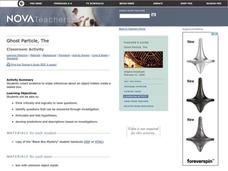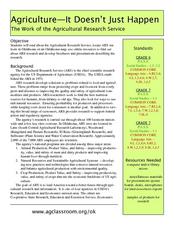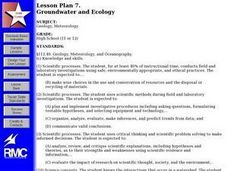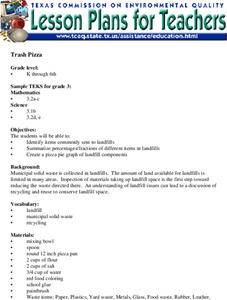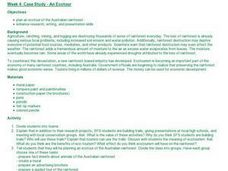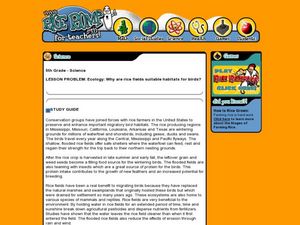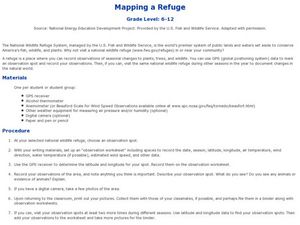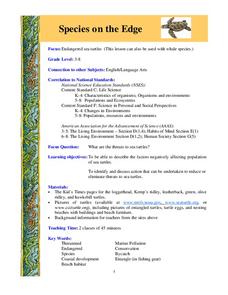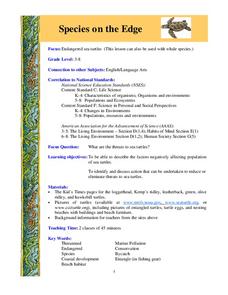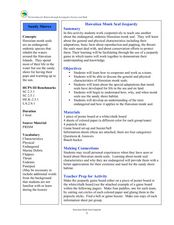Curated OER
A Reef of Your Own
Young scholars research and study the life and reproductive strategies of reef building corals. They examine how coral reefs can produce high levels of biological material when they are surviving in areas of low nutrition.
Curated OER
Naturally Speaking
Students identify the Earth's natural resources and classify them as renewable or non-renewable. They simulate the distribution of resources and discuss the fairness and effectiveness of the distribution. They identify ways that they use...
Curated OER
Bird airport control
Students identify the various species of birds found in the wetlands. Students observe and record the key skills involved in scientific inquiry. Students handle and interpret data gathered on a field trip which reveals patterns and...
Curated OER
The Ghost Particle
Students collect evidence to make inferences about a object hidden inside a sealed box. They think critically and logically to raise questions. Students identify questions that can be answered through investigation. They formulate and...
Curated OER
Human Footprint
Students study facts about humans and how they are impacting the Earth. In this investigative lesson plan students help map peoples footprints over the Earth's surface and evaluate these factors.
Curated OER
Agriculture - It Doesn't Just Happen
Sixth graders examine the role of the US Department of Agriculture. For this United States Agriculture lesson, 6th graders create maps with sites and specialty areas. Students create a presentation on the topic they were given to...
Curated OER
Meteorological Predictions
Students make a link between prediction and hypothesis in math and science. Based on data collected over one week, students evaluate the predictions of local weather forecasters, compare the predicted outcomes to the actual weather...
Curated OER
The Conscription Crises
Students explore roles played by Canada's prime ministers The Right Honorable Sir Wilfrid Laurier and The Right Honorable iam Lyon Mackenzie King with regards to the conscription crises of World War I and World War II.
Curated OER
Groundwater and Ecology
Students are presented a problem concerning an aquifer which may be in danger from overuse by agriculture/industry. They compile data and consult online data and experts in creating a proposal to rectify the situation.
Curated OER
Trash Pizza
Students work together to identify items sent to landfills. They summarize percentages of the different items found in landfills. They create a pizza pie graph of all of the components found in landfills.
Curated OER
Energy and the Environment
Fifth graders define alternative energy form, design models which show how the energy source can be used, and explain the purpose of dams.
Curated OER
Case Study - An Ecotour
Students plan an ecotour of the Australian rainforest. They prepare fact sheets about animals, create a mural, prepare a advertising brochure and a guided tour of the rainforest.
Curated OER
Reduce, Reuse, Recycle
Fourth graders discover the differences between: reduce, reuse, and recycle by performing hands on examinations. They list what would happen to the soil if we allowed the earth to wash away and briefly discuss the meaning of erosion.
Curated OER
Human Impact on the Environment and Pollution
Students illustrate the impact humans have on the environment through analogies and models. They observe demonstrations of human impact and pollution and create a composite picture of how people can have an impact on their environment.
Curated OER
What Makes you Hot?
Learners manipulate different variables in a model and make inferences about the temperature on Earth. In this heat lesson students calculate the blackbody radiation of an object at a certain temperature.
Curated OER
World Wetlands Day
In this World Wetlands Day worksheet, students read or listen to a passage, then match phrases, fill in the blanks, choose the correct words, unscramble words and sentences, put sentences in order, write discussion questions and conduct...
Curated OER
Ecology: Why Are Rice Fields Suitable Habitats for Birds?
Fifth graders discover the uses for rice by reading about the habitats of certain birds. In this agriculture lesson, 5th graders research birds from the Gulf Coast and California and their reasons for living in rice fields....
Curated OER
Mapping a Refuge
Students record observations gathered while at a national wildlife refuge. In this instructional activity on wildlife refuges, students choose an observation spot and record seasonal changes throughout the year.
Curated OER
Species on the Edge
Learners study science. In this endangered species lesson plan, students examine sea turtles and actions that can be taken to help keep them alive. They work in small groups to research different species of turtles and share their...
Curated OER
Species on the Edge
Students examine sea turtles. In this endangered species lesson, students analyze sea turtle habitats. Students hypothesize why sea turtles could go extinct.
Curated OER
Adaptations-What a Concept
Students study the pink river dolphin and how it has adapted to its environment. In this adaptations instructional activity students construct a map that represents certain relationships.
Curated OER
Hawaiian Monk Seal Jeopardy
Students explore the Hawaiian monk seal. In this science lesson, students read about the monk seal and participate in a game in which they answer questions about the Hawaiian monk seal.
Curated OER
Monomer and Polymer Chemistry
Middle schoolers explain monomer/polymer chemistry of starches and sugars.
Curated OER
Farming and the Services of a Community (Lesson 5)
Pupils identify different types of farms and services of a community. They use a pretend farm scenerio and a worksheet to distinguish between the different types of farms. They also practice using new vocabulary.
Other popular searches
- Conserving Water Resource
- Conserving Water Environment
- Conserving Water Diagram
- Earth Day Conserving Water
- Conserving Water Worksheet



